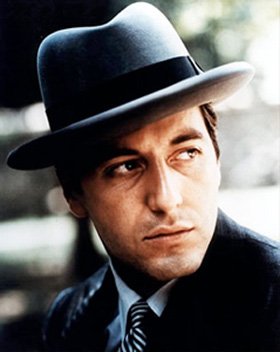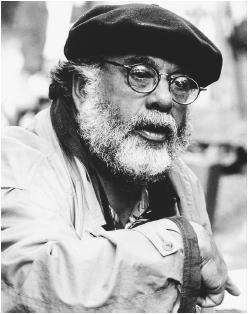
Michael Corleone was the most respectable son of Don Vito Corleone. He has the hopes of his father to do well in life in the “legitimate world” and not follow into his life in the “family business”. Michael is deeply loved by his father leading his father to murder “blackmailers” (Massimo Fanucci) so that he could support Michael’s education, and he soon became a bright handsome young man.
Michael enlisted in the army, despite his father not being happy for him to do so. He suffered wounds from battle in 1945 and was discharged to recover. During his recovery he met his future wife Kay Adams,
When Vito was nearly assassinated Michael became mixed up in the family business (the mafia), although he was determined to have nothing to do with it. His ability to think clearly under fire, to be decisive and demand respect made him the best candidate to take over the family as Godfather.
Unlike his father, who appears at ease in the role of Godfather, Michael is burdened by the responsibility. In some ways Michael sees himself as a sacrificial hero, slaving away at his “job” for the rest of his family, sacrificing himself for the well-being of those around him.
While once distanced from his family towards Kay, Michael eventually grew into the worst of everything his family represented. He love his family very much, family was the most important thing to him now.
Michael was extremely talented and powerful, but he had flaws, for example his demanding desire for vengeance which created a web of violence that he could not escape. This blinded him from the fact that achieving a legitimate life for his family was impossible. He became so vengeful he killed his own brother, Fredo.
Michael was a masterful, strategic think blinded by his vengeance. He had no tolerance for treachery and he slowly becomes bolder, more violent and ambitious than his father. To Kay, Michael was loving and tender. He was able to negotiate a deal with anyone, but he would not talk to Kay. One example of this is when Michael agrees to be honest with her about his business, and he lied. When Connie (Michael’s sister) finds out that he had Carlo (her husband) killed, she goes into a fit of rage saying that Michael is a “lousy cold-hearted bastard”. Michael claims she is just hysterical. Later when asked by Kay about his involvement, he lies to her and denies any involvement. The fact that he lies to Kay, his wife, shows his cowardness and also his unwillingness to allow even his wife into the business side of his (what turn out to be) lonely life. Michael used corrupt methods to get his family into a “legitimate” life, making his family go into a permanent state of corruption. He became very rich but became less successful in his personal life.
Michael’s character relates to the character of Harry Caul on many bases. They are both loners, in a sense that they both do not allow people into their private lives. They are both burdened by guilt and grief and they have many ways of sheltering themselves from the outside world. Michael Coreolne brought his family to ruin, lost his marriage and children, could not find redemption with his guilty conscience and in the end death is seemed to be following him everywhere and he eventually dies alone.


